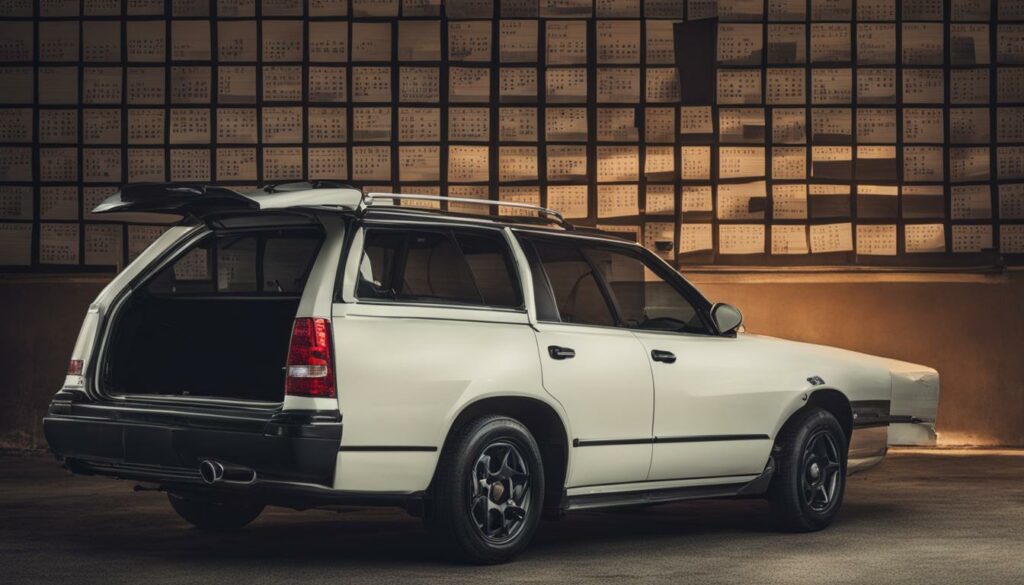Welcome to our comprehensive guide on car recalls in the United States. As a car owner, you may have received recall notifications from your vehicle manufacturer. These notifications can be confusing, and you may wonder if car recalls expire. In this guide, we will provide you with all the essential information you need to know about car recalls and whether they expire.
Key Takeaways:
- Car recalls are issued to address safety issues in vehicles.
- Manufacturers are responsible for ensuring the safety of their vehicles and issuing recalls if necessary.
- Recall notifications are sent to consumers, and repairs may be covered under warranty or may have associated costs.
- The expiration of car recalls varies depending on various factors, including manufacturer discretion and the severity of the safety issue.
- Consumer advocacy organizations can help car owners navigate the recall process and take advantage of free remedies provided by manufacturers.

Understanding Car Recalls and Safety Issues
Car recalls are a safety measure taken by automobile manufacturers to address defects or safety issues discovered in their vehicles. These defects can range from minor issues to significant safety hazards that can affect the driver, passengers, or other individuals on the road.
The responsibility of identifying and addressing these defects lies with the manufacturer. They are required by law to ensure the safety of their vehicles and take prompt action to remedy any safety issues detected.
A safety issue can be defined as a defect that poses a risk to the safety of the vehicle or its occupants. This includes issues related to the vehicle’s design, construction, performance, or materials that can create a risk of fire, crash, or injury.
Manufacturers are responsible for identifying and addressing safety issues in their vehicles, even after the vehicles have left the factory. They are obligated by law to initiate a recall if a safety issue is detected and notify the National Highway Traffic Safety Administration (NHTSA) about the recall.
The Manufacturer’s Responsibility
The manufacturer is responsible for making recalls in a timely manner and addressing the safety issue through repair, replacement, or refund. They must notify their customers about the issue and provide them with the necessary information to take appropriate action.
In addition, manufacturers must keep accurate records of the recall and warranty claims and make them available to the NHTSA upon request. Failure to comply with these regulations can result in lawsuits, fines, and damage to their reputation.
The Role of the NHTSA
The NHTSA is responsible for overseeing the recall process, ensuring that manufacturers take appropriate action to address safety issues in their vehicles. They can initiate a recall if they detect a safety issue and assess the adequacy of manufacturers’ responses to safety issues.
The NHTSA can also investigate consumer complaints and monitor industry trends to detect potential safety issues before they become widespread. Their role is critical in ensuring the safety of drivers, passengers, and other individuals on the road.
“Safety is the number one priority for automobile manufacturers, and recalls are a necessary measure to ensure the safety of their vehicles and customers.”
The Process of Car Recalls
When a safety issue is identified in a vehicle, manufacturers are required by law to issue a recall notification to the affected consumers. The notification typically includes a description of the defect or safety issue, the potential risks associated with it, and instructions on how to get the problem fixed. These notifications can be sent via mail, email, or phone, depending on the contact information provided by the vehicle owner.
Once the notification has been sent, manufacturers are responsible for making replacement parts available to consumers for free. However, the availability of parts can vary, and it may take some time for parts to become available. In some cases, manufacturers may offer to provide loaner vehicles to affected consumers until their vehicles can be repaired.
| Repair Costs | Consumer Protection |
|---|---|
| Most recall repairs are done for free, but some may have associated costs if the vehicle is no longer covered under warranty or if the recall involves parts that are not covered under warranty. | The National Highway Traffic Safety Administration (NHTSA) has regulations in place to protect consumers during the recall process. These regulations require manufacturers to provide free remedies, and in some cases, reimburse consumers for related expenses, such as rental cars or towing fees. |
It’s important to note that not all recalls are created equal. Some recalls may be more urgent than others, depending on the severity of the safety issue, and manufacturers may prioritize those repairs. As a consumer, it’s essential to respond promptly to recall notifications and not delay repairs to ensure the safety of yourself and others on the road.
“Safety is the most important consideration when it comes to car recalls. It’s crucial for manufacturers to follow the regulations set by the NHTSA and for consumers to stay informed and take advantage of the free remedies provided.”
Do Car Recalls Expire by Vehicle Age or Mileage Limitation?
Now that we have a better understanding of car recalls and safety issues, let’s dive into whether car recalls expire or not. The expiration of car recalls can be a confusing topic, but it is essential to understand as a car owner.
Firstly, it is important to note that there are no clear-cut expiration dates for car recalls based solely on vehicle age or mileage. Rather, the expiration of car recalls can depend on several factors, including the severity of the safety issue and manufacturer discretion.
The National Highway Traffic Safety Administration (NHTSA) plays a crucial role in regulating car recalls in the US. While the NHTSA does not set explicit expiration dates for car recalls, they do require manufacturers to notify consumers of any safety-related defects or noncompliance issues and provide free remedies.
Manufacturers are also required by law to remedy the safety issue at no cost to the consumer. However, the manufacturer’s responsibility ends once the car is either repaired or replaced, and they are not required to notify the next owner(s) of the recall.
If you receive a recall notification, it is essential to respond promptly and take your vehicle to a dealership for repair. Delaying the repair of a recalled vehicle can put you and your passengers at risk of injury or death.
It’s worth noting that some manufacturers may extend the recall period beyond the initial notification to ensure that all affected vehicles receive the necessary repairs. This extension is at the manufacturer’s discretion and is not regulated by the NHTSA.
Ultimately, it is crucial to stay informed about car recalls and respond promptly to any recall notifications to ensure the safety of your vehicle and yourself.
Manufacturer Discretion and Extended Recall Periods
While car recalls may not have a specific expiration date based on vehicle age or mileage, manufacturers have the discretion to extend the recall period beyond what is required by law. This decision is typically based on a variety of factors, including the severity of the safety issue, the availability of replacement parts, and the overall impact on consumers.
For example, a manufacturer may extend a recall if they discover that a safety defect affects more vehicles than initially thought or if they are unable to produce enough replacement parts to complete the necessary repairs in a timely manner.
Additionally, manufacturers may extend the recall period if they are required to do so by the National Highway Traffic Safety Administration (NHTSA). The NHTSA has the authority to mandate a recall if they determine that a safety issue presents an unreasonable risk to public safety or if a manufacturer fails to initiate a recall when required.
Extended Recall Periods in Action:
| Manufacturer | Issue | Extended Recall Period |
|---|---|---|
| Ford | Faulty fuel system | Extended recall period for 10 years |
| Toyota | Sticking accelerator pedal | Extended recall period for 20 years |
In some cases, an extended recall period may be beneficial for consumers as it provides them with additional time to have the necessary repairs completed. However, it is important to note that the availability of replacement parts may still be a limiting factor, even with an extended recall period.
If you are unsure whether your vehicle is affected by a recall or have questions about the recall process, you can contact the manufacturer or visit the NHTSA website for more information.

Consumer Rights and Free Remedies
As a car owner, you have certain rights when it comes to car recalls. The National Highway Traffic Safety Administration (NHTSA) requires manufacturers to notify you of any recalls and provide a free remedy to correct the problem. It is essential to respond promptly to recall notifications and take advantage of the free remedy provided by the manufacturer to ensure the safety of your vehicle and everyone on the road.
If you encounter problems or have questions about the recall process, there are consumer advocacy organizations that can help. These organizations provide assistance and guidance to consumers to ensure they understand their rights and how to navigate the recall process. They can also advocate on your behalf to ensure that manufacturers are meeting their legal requirements.
It’s important to note that the free remedy provided by the manufacturer must be adequate to correct the safety issue. If the remedy is insufficient or does not address the problem, you may have the right to pursue legal action against the manufacturer. It is important to consult with a lawyer experienced in product liability who can advise you on your legal options.
Overall, as a car owner, you have the right to expect that your vehicle is safe to operate and that manufacturers will take responsibility for any safety issues. Consumer advocacy organizations and legal options are available to ensure that your rights are protected and that you receive the free remedy you are entitled to under the law.
Conclusion
Congratulations, you have reached the end of our comprehensive guide on car recalls. We hope that you now have a better understanding of the topic and can make informed decisions regarding the safety of your vehicle. Remember, car recalls do not necessarily expire based on vehicle age or mileage, so it’s crucial to respond promptly to recall notifications and take advantage of the free remedies provided by manufacturers.
By staying informed and proactive, you can help ensure the safety of yourself, your passengers, and other drivers on the road. Don’t hesitate to contact consumer advocacy organizations or seek legal advice if you encounter any issues during the recall process. Your safety and peace of mind are our top priorities.


